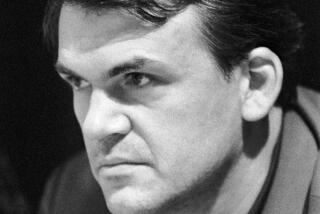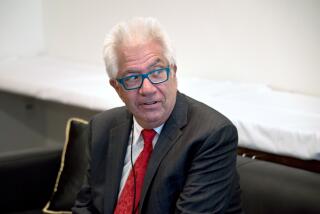Martin E. Malia, 80; Berkeley Professor Was Expert on Soviet Union
Martin E. Malia, a leading expert on the Soviet Union who predicted the dissolution of communism in that country, has died. He was 80.
Malia, who taught at UC Berkeley for more than three decades, died Nov. 19 at a convalescent hospital in Oakland. He had been in failing health battling pneumonia and a series of infections.
An influential and respected writer on Soviet communism, Malia generated some controversy and international speculation in 1990, when he anonymously published an article titled “To the Stalin Mausoleum” in Daedalus, the journal of the American Academy of Arts and Sciences.
The article, signed with just the initial Z, said that Soviet President Mikhail S. Gorbachev was pursuing only halfway measures that would not reform the Soviet Union. Those efforts, the article said, would lead to the end of Soviet communism.
The piece created a stir in Washington, where the George H.W. Bush administration was giving Gorbachev its firm backing. Some observers thought the piece might have been written by someone within the administration -- Condoleezza Rice, then the National Security Agency’s Soviet specialist, was named as one possibility -- to put pressure on Gorbachev to speed reforms. Others thought it was Zbigniew Brzezinski, former President Jimmy Carter’s national security advisor.
Malia ultimately conceded authorship of the article and said he had wanted anonymity to protect sources inside the Soviet Union.
Use of the initial Z recalled a similarly influential -- and anonymously published -- article written in the early days of the Cold War that outlined the U.S. policy of containment toward Moscow for the next three decades. The author of that article, which appeared in Foreign Affairs under the initial X, was George Kennan, who at the time was head of policy planning at the State Department.
Malia had written books and articles on socialism and the Soviet state for four decades when the Daedalus article appeared.
His best-known book is “The Soviet Tragedy: A History of Socialism in Russia, 1917-1991,” which covered the Russian revolution to the perestroika reforms under Gorbachev.
In Malia’s view, socialism was the cause of the Soviet decline after the revolution and led to totalitarianism under Joseph Stalin. He also argued that implementation of a true socialist state was impossible because it bred repressive rule. In Soviet history, that meant Stalin and hard-line successors.
Writing in the New York Review of Books, David Remnick, a former correspondent in the Soviet Union for the Washington Post, said Malia’s book constituted “an essential coda to the literature of Soviet studies.”
In the New Republic, Walter Laqueur placed Malia’s book “among the most important studies of modern Russian history to have appeared in many years.”
The New York Times called another major work, “Russia Under Western Eyes,” published in 1990, “the most insightful book published in any language to date on Russia’s place in European intellectual and political history.”
Malia was born in Springfield, Mass., on March 14, 1924. He earned a bachelor’s degree in French from Yale University and a master’s and PhD in history from Harvard University. He served in the Navy during World War II.
He taught at Harvard as an assistant professor of history and worked at the Library of Congress as a special assistant for Russian book acquisition. He joined the Berkeley faculty in 1958 and retired in 1991.
At the time of his death, he was completing a book comparing the American, Russian and French revolutions.
He is survived by four nephews and a niece.
More to Read
Sign up for Essential California
The most important California stories and recommendations in your inbox every morning.
You may occasionally receive promotional content from the Los Angeles Times.









